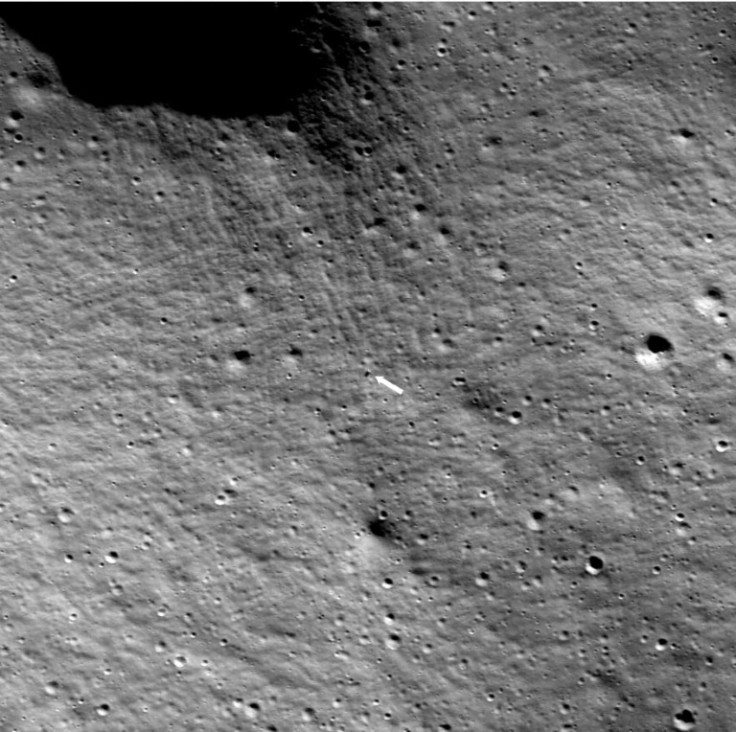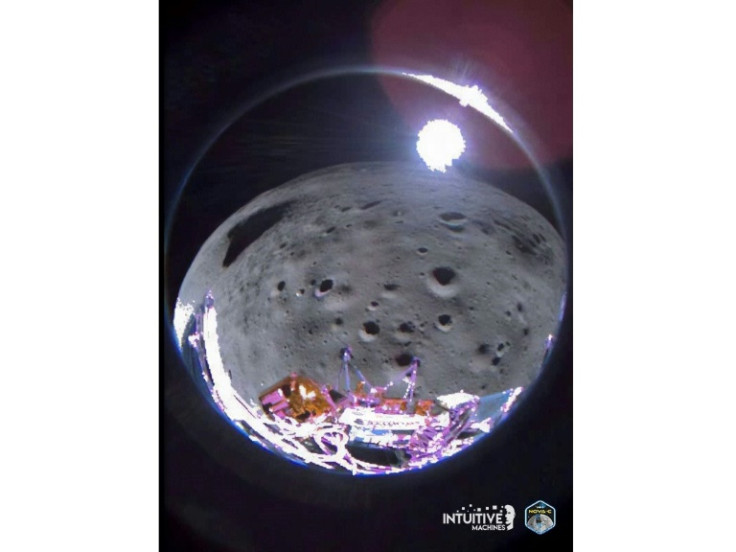
An American lunar lander that tipped over during touchdown has sent back its first images from the farthest south any vessel has ever landed on the Moon.
The uncrewed Odysseus, built by Houston-based Intuitive Machines, returned the United States to Earth's cosmic neighbor last week after a five-decade absence, in a first for the private sector.
But one of its legs caught on the surface as it came down, making it pitch over in the final act of a drama-packed journey that was saved by an improvised fix.
"Odysseus continues to communicate with flight controllers in Nova Control from the lunar surface," Intuitive Machines said Monday in an update on X.
The post included two pictures: one from the hexagon-shaped spaceship's descent, and the other taken 35 seconds after it fell over, revealing the pockmarked soil of the Malapert A impact crater.
NASA is planning to return astronauts to the Moon later this decade, and paid Intuitive Machines around $120 million for the mission, as part of a new initiative to delegate cargo missions to the private sector and stimulate a commercial lunar economy.
Odysseus carries a suite of NASA instruments designed to improve scientific understanding of the lunar south pole, where the space agency plans to send astronauts under its Artemis program later this decade.
Unlike during Apollo, the plan is to build long-term habitats, harvesting polar ice for drinking water and for rocket fuel for onward missions to Mars.
NASA's Lunar Reconnaissance Orbiter (LRO) probe meanwhile photographed the 4.0-meter (13 feet) tall "Nova-C" class lander on Saturday at a spot within 1.5 kilometers (a mile) of its intended landing site.
The student team behind an external camera that was initially meant to shoot out from Odysseus during its descent said in a weekend update they remained "optimistic" EagleCam could still be ejected from the fallen lander and snap photos from around four meters away.
Astronomer and space missions expert Jonathan McDowell told AFP the fact that Odysseus was lying on its side didn't overly concern him.
It's a "success with minor footnotes -- I'd give it an A minus," he said, adding that one would "prefer it to be upright, and they've certainly got some things to figure out for future missions," but overall things are moving in the right direction for NASA's Commercial Lunar Payload Services (CLPS) initiative.
On Friday, Intuitive Machines revealed its engineers had forgotten to toggle a safety switch that prevented the spaceship's laser-guided landing system from engaging, which forced them to upload a software patch and rely on an experimental NASA system to save the day.
"Rocket science is hard not because any one thing is super hard, but because you have to do a million easy things all right," said McDowell of the "embarrassing" oversight.
Flight controllers will continue to download data until the lander's solar panels are no longer exposed to light, which is now estimated to be Tuesday morning, said Intuitive Machines.
It is a slightly shorter mission duration than initially planned, likely as a result of the spacecraft's awkward orientation.
Japan's space agency also landed a spaceship wonkily on the Moon last month, but produced a surprise on Monday by waking up its SLIM lander following the lunar night, which lasts around two Earth weeks.
McDowell said the two falls might indicate the current generation of landers are too top heavy and consequently tip over too easily in low gravity, unlike the short, squat landers with splayed legs built by the United States and Soviet Union during the Cold War.
Intuitive Machines joined an exclusive club of five countries that have achieved soft lunar landings: the Soviet Union, the United States, China, India and Japan. Three prior private attempts failed, including by another American company, Astrobotic, last month.








